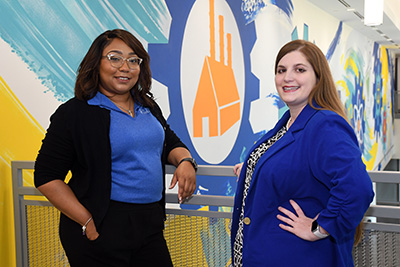Neurodiversity support celebrates diverse minds

Dana Jenkins-Post started her role at San Jacinto College with one resolve: “I can do more.”
Throughout her career, she has helped everyone from K-12 special education students to adults seeking disability support. She watched them transition to college, search for jobs, or navigate community services.
Often, support dropped off after high school.
“My former high school students kept coming back to me asking for help,” she said. “They weren’t getting the help they needed in college.”
When San Jac posted the neurodiversity support services coordinator position, she saw her chance to bridge the gap in services.
Qualifying for neurodiversity support

“Rather than seeing these differences as deficits or disorders, neurodiversity highlights the unique strengths and perspectives that individuals with diverse neurological makeups offer,” she said.
To qualify for neurodiversity support, students must self-identify as neurodivergent and fill out an intake form. One-on-one coaching helps them develop academic and personal skills, and a coming neurodiversity club will help build community.
Tailoring support
According to Jenkins-Post’s leader, Samra Ward, San Jac neurodivergent students do the same curriculum as their peers — unlike many other community colleges’ programs.
“We’re here to support them in the dreams they already have or help them find those dreams and not be defined by a label others give them,” Ward, student access resources director, said.
The support needed is as unique as the students themselves. Jenkins-Post helped one student identify multi-step processes, like requesting a professor’s assistance. Instead of asking for help during a lecture, the student learned how to research the instructor’s contact information, schedule a meeting, and prepare discussion topics.
Another student worked with her to break down big assignments into manageable chunks.
Regular check-ins increase accountability.
Rather than seeing these differences as deficits or disorders, neurodiversity highlights the unique strengths and perspectives that individuals with diverse neurological makeups offer.
Celebrating differences
San Jac also offers neurodiversity training to interested faculty and staff, who embrace differences as “not just OK but good.”
“Our faculty see these students as humans navigating highs and lows,” Ward said. “They see them as people, not just a label — someone they’re excited to teach and support.”
The neurodiversity program adapts its approach to every student, making sure they feel heard while building their independence. After all, isn’t that the College’s goal — helping each student thrive?
“This goes beyond a neurodiversity or neurotypical discussion,” Jenkins-Post said. “It’s about meeting people’s needs, meeting them where they are. If you meet their needs, you can help them succeed.”
Read more stories from the Chancellor's Report to the Community
